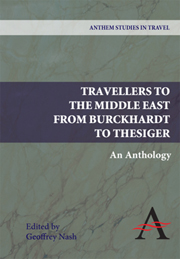Book contents
- Frontmatter
- Contents
- Acknowledgements
- Introduction
- PART ONE THE COMING OF EMPIRE 1800–1879
- PART TWO COLONIALISM AND RESISTANCE 1880–1950
- Ottoman and Former Ottoman Territories
- 1 A Wandering Scholar in the Levant
- 2 Dar-ul-Islam
- 3 Turkey in Revolution
- 4 An Englishwoman in a Turkish Harem
- 5 Three Deserts
- 6 Letters from Palestine, 1932–1936
- Arabia
- Persia/Iran
- Bibliography
5 - Three Deserts
from Ottoman and Former Ottoman Territories
Published online by Cambridge University Press: 05 March 2012
- Frontmatter
- Contents
- Acknowledgements
- Introduction
- PART ONE THE COMING OF EMPIRE 1800–1879
- PART TWO COLONIALISM AND RESISTANCE 1880–1950
- Ottoman and Former Ottoman Territories
- 1 A Wandering Scholar in the Levant
- 2 Dar-ul-Islam
- 3 Turkey in Revolution
- 4 An Englishwoman in a Turkish Harem
- 5 Three Deserts
- 6 Letters from Palestine, 1932–1936
- Arabia
- Persia/Iran
- Bibliography
Summary
Son of an East London insurance clerk, C.S. Jarvis achieved success as a colonial administrator in Egypt despite not coming from the usual social background and being without a public school education. When 17 he joined the merchant navy as an apprentice, fought as a trooper in the South African War between 1899 and 1902, and in the Great War served in France, Egypt and Palestine reaching the rank of major. Having acquired a good knowledge of Arabic he joined the Egyptian frontiers administration in the Western Desert and was transferred to Sinai in 1922 where he was governor until his retirement in 1936. Thereafter he made a new career for himself writing, drawing upon the knowledge and experience he had acquired during his years among the Arabs in the Egyptian deserts. The Royal Central Asian Society awarded him its Lawrence Memorial Medal in 1938, but he was not a believer in the causes Lawrence espoused. He claimed to have had ample experience of the real Bedouin character and in his books gave many instances of their factiousness, laziness and lust for money.
From:
Three Deserts (1936)
A practical administrator who contributed to desert reclamation during his fourteen years in Sinai, Jarvis argues that the Bedouin were in part responsible for reducing scrub land to desert because they allowed their animals to destroy its trees and vegetation.
- Type
- Chapter
- Information
- Travellers to the Middle EastAn Anthology, pp. 169 - 175Publisher: Anthem PressPrint publication year: 2009



